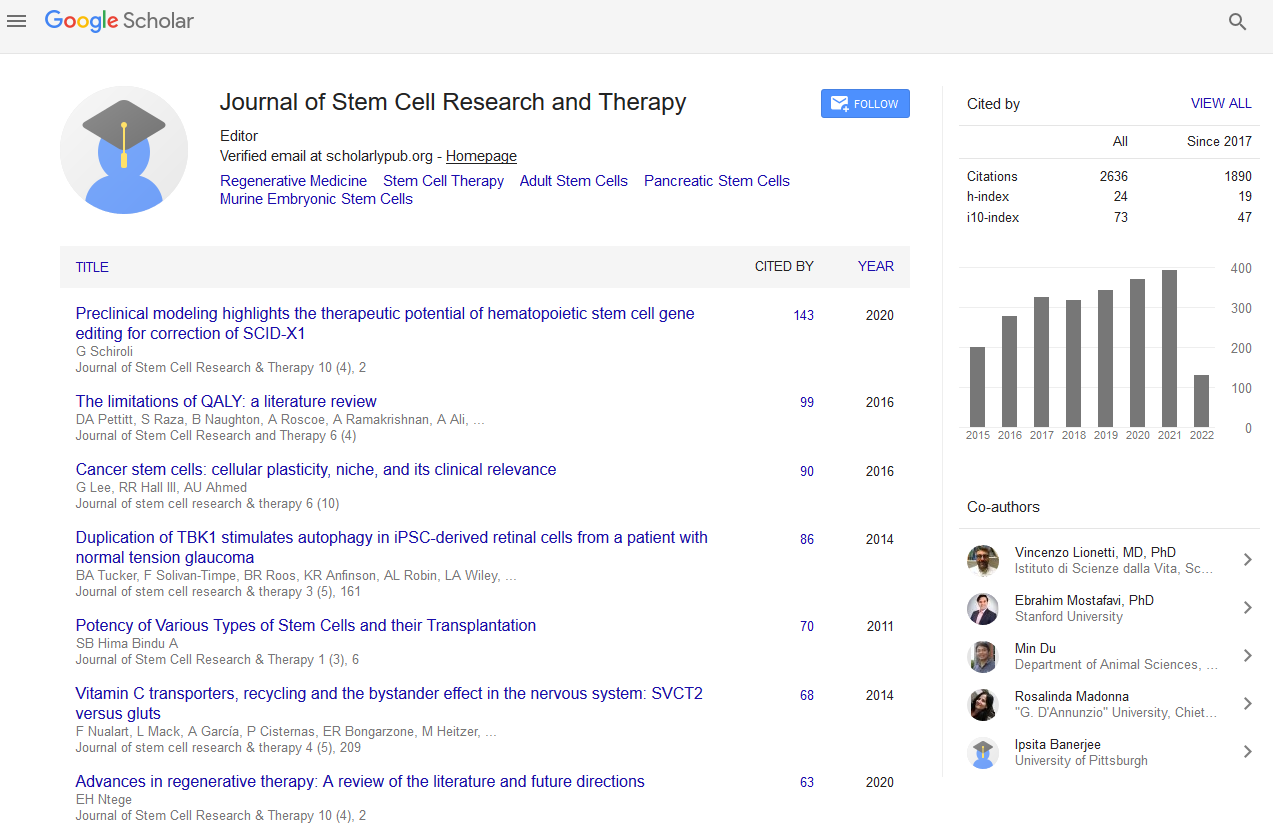Indexed In
- Open J Gate
- Genamics JournalSeek
- Academic Keys
- JournalTOCs
- China National Knowledge Infrastructure (CNKI)
- Ulrich's Periodicals Directory
- RefSeek
- Hamdard University
- EBSCO A-Z
- Directory of Abstract Indexing for Journals
- OCLC- WorldCat
- Publons
- Geneva Foundation for Medical Education and Research
- Euro Pub
- Google Scholar
Useful Links
Share This Page
Journal Flyer

Open Access Journals
- Agri and Aquaculture
- Biochemistry
- Bioinformatics & Systems Biology
- Business & Management
- Chemistry
- Clinical Sciences
- Engineering
- Food & Nutrition
- General Science
- Genetics & Molecular Biology
- Immunology & Microbiology
- Medical Sciences
- Neuroscience & Psychology
- Nursing & Health Care
- Pharmaceutical Sciences
High MACC1 expression in combination with mutated KRAS G13 indicates poor survival of colorectal cancer patients
4th International Conference and Exhibition on Cell & Gene Therapy
August 10-12, 2015 London, UK
Katharina Ilm1, Wolfgang Kemmner1, Marc Osterland1, Susen Burock2, Gudrun Koch1, Pia Herrmann1, Peter M Schlag1,2,3, and Ulrike Stein1,3
Scientific Tracks Abstracts: J Stem Cell Res Ther
Abstract:
Colorectal cancer (CRC) is the third most common cancer worldwide. The metastasis-associated in colon cancer 1 (MACC1)
gene has been identified as prognostic biomarker for CRC. Here, we aimed at the refinement of risk assessment by separate
and combined survival analyses of MACC1 expression with any of the markers KRAS mutated in codon 12 (KRAS G12) or
codon 13 (KRAS G13), BRAFV600 mutation and MSI status in a retrospective study of 99 CRC patients with tumors staged I,
II and III. Our results showed that high MACC1 expression (HR: 6.09, 95% CI: 2.50-14.85, P<0.001) and KRAS G13 mutation
(HR: 5.19, 95% CI: 1.06-25.45, P=0.042) were the only independent prognostic markers for shorter metastasis-free survival
(MFS). Accordingly, Cox regression analysis revealed that patients with high MACC1 expression and KRAS G13 mutation
exhibited the worst prognosis (HR: 14.48, 95% CI: 3.37-62.18, P<0.001). By integrative 2-step cluster analysis the patient cohort
was classified into four clusters with statistically different MFS (P=0.003) which coincided well with the different CRC pathways.
According to our results, patients of the group with mutated KRAS G13 and high MACC1 expression exhibited the highest risk
for metachronous metastasis formation. Moreover, we demonstrated that the “traditional pathway” with an intermediate risk
for metastasis formation can be further subdivided by assessing MACC1 expression into a low and high risk group with regard
to MFS prognosis. The identification of CRC patients at high risk for metastasis is possible by assessing MACC1 expression in
combination with KRAS G13 mutation.
Biography :
Katharina Ilm is a PhD student in the research team of Prof. Dr. Ulrike Stein at the Experimental and Clinical Research Center (ECRC, Charité Campus Buch)
in Berlin. She completed her Master’s degree at the University of Lübeck in 2011 and directly started her PhD in the translational oncology field at the MDC. In
her PhD she is focusing on prognostic marker analyses for optimized identification of high risk patients for metastasis. Further she is investigating the regulatory
mechanisms which are involved in the disrupted expression patterns of the promising biomarker MACC1 in primary tumors and metastases.


